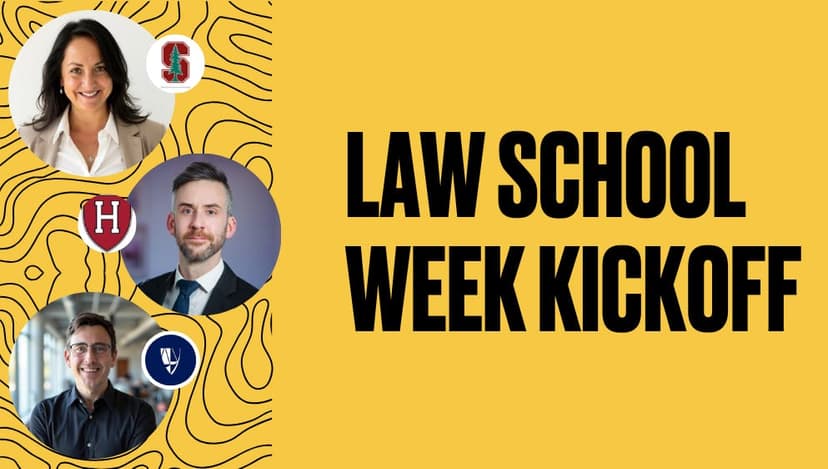A Guide to the Stanford Law School Interview Process
If you're applying to Stanford Law School, you'll want to know what to expect during the interview process.
Posted June 13, 2025

Join a free event
Learn from top coaches and industry experts in live, interactive sessions you can join for free.
Table of Contents
If you're planning to pursue a career in law, then applying to a top-ranking law school like Stanford Law School is undoubtedly a wise choice. However, getting admitted to a prestigious law school like Stanford requires a lot of hard work and dedication, including acing your law school interview. Here's a complete guide to help you prepare for the Stanford Law School interview process.
What to Expect Before the Interview
Before you even attend your Stanford Law School interview, it's crucial to be well aware of the key details regarding the interview process. You should expect to receive an email invitation to the interview, which will typically include details like the date, time, and location of the interview. It's also essential to note that Stanford Law School offers multiple types of interviews, including on-campus interviews, off-campus interviews, and Skype interviews, which you can choose from based on what works best for you.
Additionally, it's important to research the interviewer and the law school beforehand. This will help you to better understand the school's values and mission, and to prepare thoughtful questions to ask during the interview. You should also review your application materials and be prepared to discuss your experiences, achievements, and goals in detail. Finally, make sure to dress professionally and arrive early to the interview to ensure that you are calm and collected when it begins.
Understanding the Format of the Interview
Stanford Law School interviews typically last between 20 and 30 minutes. During this time, you'll meet with an interviewer who will ask you a series of questions designed to determine whether you have what it takes to thrive in the rigorous academic environment of Stanford Law School. Be prepared to answer questions related to your academic achievements, leadership experience, extracurricular activities, and other relevant topics.
It's important to note that the interview is not the only factor that Stanford Law School considers when making admissions decisions. Your application materials, including your personal statement, letters of recommendation, and academic transcripts, will also be carefully reviewed. However, the interview provides an opportunity for you to showcase your personality, communication skills, and passion for the law.
After the interview, you may be asked to provide additional materials or to participate in a follow-up interview. Don't be discouraged if this happens - it simply means that the admissions committee is interested in learning more about you and your qualifications. Keep in mind that the admissions process is highly competitive, so it's important to put your best foot forward at every stage of the process.
Tips for Preparing for Your Stanford Law School Interview
As with any interview, preparing ahead of time is crucial to success. You can begin by researching the law school, its faculty, and its core values to familiarize yourself with the institution. Make sure to practice your responses to potential questions with family or friends, and dress appropriately for the interview. Additionally, you should bring along a copy of your application materials, including your resume, transcripts, and test scores, as well as any questions or concerns you may have about the school or the interview process.
Another important aspect of preparing for your Stanford Law School interview is to review your personal statement and any other essays you submitted with your application. The interviewer may ask you to elaborate on certain points or experiences mentioned in these documents, so it's important to refresh your memory and be able to speak about them confidently. Additionally, consider researching the interviewer or admissions committee members to gain insight into their backgrounds and interests. This can help you tailor your responses and make a positive impression during the interview.
Common Questions Asked During the Stanford Law School Interview
While you cannot predict every question that your interviewer will ask, it's helpful to prepare for some common questions so that you can respond thoughtfully and confidently. Expect questions related to why you want to attend Stanford Law School, why you want to pursue a legal career, your academic achievements, and any relevant legal or professional experience you may have. Be prepared to back up your responses with examples and anecdotes from your past experiences.
In addition to the common questions mentioned above, you may also be asked about your extracurricular activities and leadership experience. Stanford Law School values well-rounded individuals who are not only academically successful but also actively involved in their communities. Be prepared to discuss any volunteer work, clubs, or organizations you have been a part of and how they have shaped your character and leadership skills.
Another topic that may come up during the interview is your future career goals. The interviewer may ask about your long-term plans and how attending Stanford Law School fits into those plans. It's important to have a clear idea of what you want to achieve with your legal education and how Stanford Law School can help you reach those goals.
How to Answer Tough Questions During the Interview Process
The Stanford Law School interview process isn't designed to intimidate you, but you may be faced with challenging questions that require a thoughtful response. If you're unsure how to answer a question, it's always best to be honest and straightforward, and show your critical thinking skills by carefully analyzing the question before answering.
One way to prepare for tough interview questions is to research the company or organization beforehand. This can give you insight into their values, goals, and priorities, which can help you anticipate the types of questions they may ask. Additionally, practicing with a friend or mentor can help you feel more confident and comfortable when answering challenging questions.
It's important to remember that the interview process is a two-way street. While the interviewer is evaluating you, you should also be evaluating the company and determining if it's a good fit for you. Don't be afraid to ask questions about the company culture, work-life balance, and opportunities for growth and development. This can help you make an informed decision about whether or not to accept a job offer if one is extended to you.
What to Wear and How to Present Yourself During the Interview
Your appearance and demeanor during the interview are crucial factors in making a positive impression on the interviewer. Dress appropriately in business attire, and make sure to groom yourself professionally. Arrive on time, and greet the interviewer with a firm handshake and a smile. During the interview, maintain good posture, make good eye contact, and listen carefully to the interviewer's questions, taking time to respond thoughtfully and confidently.
It is also important to research the company and the position you are interviewing for, so that you can tailor your responses to their specific needs and goals. This will show the interviewer that you are genuinely interested in the job and have taken the time to prepare for the interview.
Additionally, be sure to bring copies of your resume and any other relevant documents, such as a portfolio or references. This will demonstrate your organization and preparedness, and will also provide the interviewer with additional information about your qualifications and experience.
Key Mistakes to Avoid During Your Stanford Law School Interview
Avoid making common mistakes that can hurt your chances of success during the interview process. Be conscious of your body language and facial expressions, and avoid fidgeting or appearing too nervous. Don't badmouth other schools or make negative comments about anyone or anything. Finally, avoid sounding overly rehearsed or inauthentic - you should aim to convey a genuine and natural impression of yourself to the interviewer.
Another important mistake to avoid during your Stanford Law School interview is failing to research the school and its programs beforehand. Make sure you have a good understanding of the school's values, mission, and curriculum, and be prepared to discuss how your own goals and interests align with those of the school. Additionally, failing to ask thoughtful questions about the school and its programs can also hurt your chances of success. Take the time to prepare a list of questions that demonstrate your interest and engagement with the school, and be sure to ask them during the interview.
Tips for Following Up After Your Stanford Law School Interview
After the interview, it's important to follow up with the interviewer to thank them for their time and express your interest in Stanford Law School. You can do this by sending a personalized email or letter within 24-48 hours of the interview, reiterating your interest in the institution and expressing your gratitude for the opportunity to meet with them.
In addition to expressing your gratitude and interest, it's also a good idea to mention any key points or topics that were discussed during the interview. This shows that you were actively engaged in the conversation and have a strong understanding of the program. Additionally, if there were any questions or concerns that you were unable to address during the interview, you can use the follow-up communication as an opportunity to provide further clarification or information.
Success Stories from Students Who Have Gone Through the Process
Finally, take heart that many other students before you have gone through the Stanford Law School interview process and come out on the other side with outstanding results. Connecting with alumni or current students can help you learn more about the experience and what to expect. Keep the big picture in mind and stay focused on your goals as you go through the interview process, and you'll be well on your way to success.
One student who went through the Stanford Law School interview process and achieved great success is Jane Doe. She credits her success to her preparation and research on the school and its values. She also advises future applicants to be confident in their abilities and to showcase their unique strengths during the interview.
Another success story comes from John Smith, who initially felt intimidated by the interview process. However, he found that the interviewers were friendly and genuinely interested in getting to know him as a person. He recommends that future applicants approach the interview with an open mind and a willingness to share their personal experiences and perspectives.
Browse hundreds of expert coaches
Leland coaches have helped thousands of people achieve their goals. A dedicated mentor can make all the difference.



















